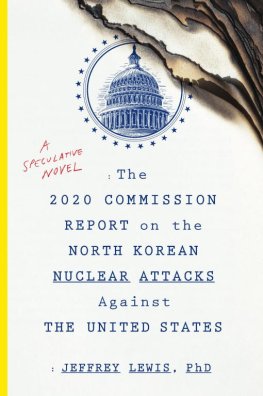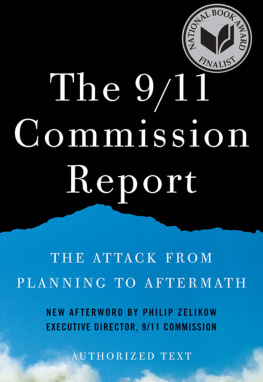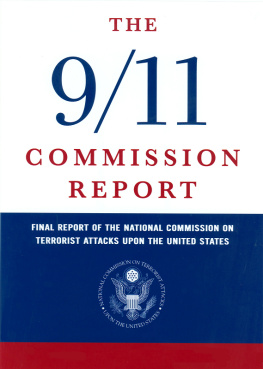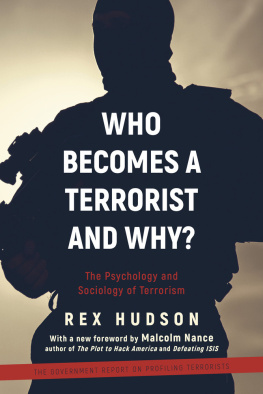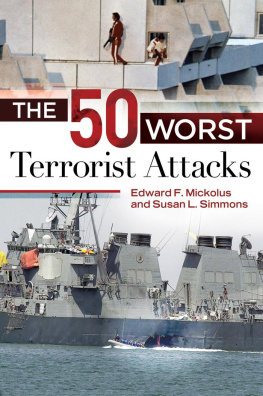THE 9/11
COMMISSION
REPORT
THE 9/11
COMMISSION
REPORT
Final Report of the
National Commission on Terrorist
Attacks Upon the United States
OFFICIAL GOVERNMENT EDITION
For sale by the Superintendent of Documents, U.S. Government Printing Office
Internet: bookstore.gpo.gov Phone: toll free (866) 512-1800; DC area (202) 512-1800
Fax: (202) 512-2250 Mail: Stop SSOP, Washington, DC 20402-0001
ISBN 978-0-16-089180-9
CONTENTS
LIST OF ILLUSTRATIONS
AND TABLES

COMMISSION
MEMBERS
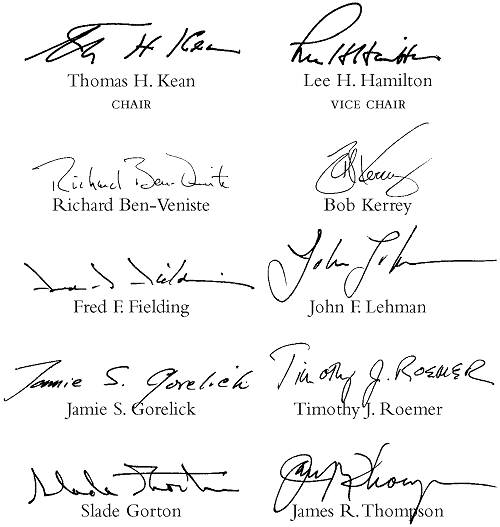
COMMISSION
STAFF
Philip Zelikow, Executive Director
Christopher A. Kojm, Deputy Executive Director
Daniel Marcus, General Counsel
Joanne M. Accolla
Staff Assistant
Alexis Albion
Professional Staff Member
Scott H. Allan, Jr.
Counsel
John A. Azzarello
Counsel
Caroline Barnes
Professional Staff Member
Warren Bass
Professional Staff Member
Ann M. Bennett
Information Control Officer
Mark S. Bittinger
Professional Staff Member
Madeleine Blot
Counsel
Antwion M. Blount
Systems Engineer
Sam Brinkley
Professional Staff Member
Geoffrey Scott Brown
Research Assistant
Daniel Byman
Professional Staff Member
Dianna Campagna
Manager of Operations
Samuel M.W. Caspersen
Counsel
Melissa A. Coffey
Staff Assistant
Lance Cole
Consultant
Marquittia L. Coleman
Staff Assistant
Marco A. Cordero
Professional Staff Member
Rajesh De
Counsel
George W. Delgrosso
Investigator
Gerald L. Dillingham
Professional Staff Member
Thomas E. Dowling
Professional Staff Member
Steven M. Dunne
Deputy General Counsel
Thomas R. Eldridge
Counsel
Alice Falk
Editor
John J. Farmer, Jr.
Senior Counsel & Team Leader
Alvin S. Felzenberg
Deputy for Communications
Lorry M. Fenner
Professional Staff Member
Susan Ginsburg
Senior Counsel & Team Leader
T. Graham Giusti
Security Officer
Nicole Marie Grandrimo
Professional Staff Member
Douglas N. Greenburg
Counsel
Barbara A. Grewe
Senior Counsel, Special Projects
Elinore Flynn Hartz
Family Liaison
Leonard R. Hawley
Professional Staff Member
L. Christine Healey
Senior Counsel & Team Leader
Karen Heitkotter
Executive Secretary
Walter T. Hempel II
Professional Staff Member
C. Michael Hurley
Senior Counsel & Team Leader
Dana J. Hyde
Counsel
John W. Ivicic
Security Officer
Michael N. Jacobson
Counsel
Hunter W. Jamerson
Intern
Bonnie D. Jenkins
Counsel
Reginald F. Johnson
Staff Assistant
R.William Johnstone
Professional Staff Member
Stephanie L. Kaplan
Special Assistant & Managing Editor
Miles L. Kara, Sr.
Professional Staff Member
Janice L. Kephart
Counsel
Hyon Kim
Counsel
Katarzyna Kozaczuk
Financial Assistant
Gordon Nathaniel Lederman
Counsel
Daniel J. Leopold
Staff Assistant
Sarah Webb Linden
Professional Staff Member
Douglas J. MacEachin
Professional Staff Member & Team Leader
Ernest R. May
Senior Adviser
Joseph McBride
Intern
James Miller
Professional Staff Member
Kelly Moore
Professional Staff Member
Charles M. Pereira
Professional Staff Member
John Raidt
Professional Staff Member
John Roth
Senior Counsel & Team Leader
Peter Rundlet
Counsel
Lloyd D. Salvetti
Professional Staff Member
Kevin J. Scheid
Professional Staff Member & Team Leader
Kevin Shaeffer
Professional Staff Member
Tracy J. Shycoff
Deputy for Administration & Finance
Dietrich L. Snell
Senior Counsel & Team Leader
Jonathan DeWees Stull
Communications Assistant
Lisa Marie Sullivan
Staff Assistant
Quinn John Tamm, Jr.
Professional Staff Member
Catharine S.Taylor
Staff Assistant
Yoel Tobin
Counsel
Emily Landis Walker
Professional Staff Member & Family Liaison
Garth Wermter
Senior IT Consultant
Serena B.Wille
Counsel
Peter Yerkes
Public Affairs Assistant
PREFACE
W E PRESENT THE NARRATIVE of this report and the recommendations that flow from it to the President of the United States, the United States Congress, and the American people for their consideration. Ten Commissionersfive Republicans and five Democrats chosen by elected leaders from our nations capital at a time of great partisan divisionhave come together to present this report without dissent.
We have come together with a unity of purpose because our nation demands it. September 11, 2001, was a day of unprecedented shock and suffering in the history of the United States. The nation was unprepared. How did this happen, and how can we avoid such tragedy again?
To answer these questions, the Congress and the President created the National Commission on Terrorist Attacks Upon the United States (Public Law 107-306, November 27, 2002).
Our mandate was sweeping. The law directed us to investigate facts and circumstances relating to the terrorist attacks of September 11, 2001, including those relating to intelligence agencies, law enforcement agencies, diplomacy, immigration issues and border control, the flow of assets to terrorist organizations, commercial aviation, the role of congressional oversight and resource allocation, and other areas determined relevant by the Commission.
In pursuing our mandate, we have reviewed more than 2.5 million pages of documents and interviewed more than 1,200 individuals in ten countries. This included nearly every senior official from the current and previous administrations who had responsibility for topics covered in our mandate.
We have sought to be independent, impartial, thorough, and nonpartisan. From the outset, we have been committed to share as much of our investigation as we can with the American people. To that end, we held 19 days of hearings and took public testimony from 160 witnesses.
Our aim has not been to assign individual blame. Our aim has been to provide the fullest possible account of the events surrounding 9/11 and to identify lessons learned.
We learned about an enemy who is sophisticated, patient, disciplined, and lethal. The enemy rallies broad support in the Arab and Muslim world by demanding redress of political grievances, but its hostility toward us and our values is limitless. Its purpose is to rid the world of religious and political pluralism, the plebiscite, and equal rights for women. It makes no distinction between military and civilian targets. Collateral damage is not in its lexicon.
We learned that the institutions charged with protecting our borders, civil aviation, and national security did not understand how grave this threat could be, and did not adjust their policies, plans, and practices to deter or defeat it. We learned of fault lines within our governmentbetween foreign and domestic intelligence, and between and within agencies. We learned of the pervasive problems of managing and sharing information across a large and unwieldy government that had been built in a different era to confront different dangers.
Next page

